










Callie Harkins
weeklyringer.eic@gmail.com
Associate Editor
Emma Kingkeo News Editor Ky Huynh
weeklyringer.online@gmail.com weeklyringer.sports@gmail.com weeklyringer.life@gmail.com weeklyringer.opinion@gmail.com weeklyringer.news@gmail.com weeklyringer.associate@gmail.com
MEAGHAN VAN DYKE Staff Writer
As class registration began earlier this month for Mary Washington students, many experienced technological frustrations with Banner, leaving them unable to successfully register for the classes they need to complete their degrees.
“I got all my classes except for one, but the process itself was terrifying because once I loaded all my CRNS, it took a whopping 15 minutes for it to load whether I had gotten them or not,” said Boyd.
She continued, “Classes that had previously been stated as available to me became not available for an unknown reason. They
Opinion Editor
Claire Marshall Watkins
Life Editor
Grace Wagner
Sports Editor
Thomas Jackson
Online Editor
Abbey Magnet
Photography Editor
Abbey Magnet weeklyringer.photos@gmail.com
Copy Editor Abbey Magnet weeklyringer.copy@gmail.com
Faculty Advisor
Sushma Subramanian
ssubrama@umw.edu
Corrections
Please report any corrections to Callie Harkins at weeklyringer.eic@gmail.com or Sushma Subramanian at ssubrama@umw.edu
According to Associate Provost and University Registrar Rita Dunston, Banner—the system used for registration, final grades, student records and financial aid applications—experienced a slight delay during the designated 8 a.m. time slots of the first two registration days. Many students reported longer wait times while on Banner to confirm registration, with error messages preventing them from selecting classes.
“I got most of the classes I want/needed in the end, but it took a few days to get there,” junior geology major Sarah Birkinshaw said. “I’m lowkey still stressed about it.”
The Banner crash comes at the heels of other technological complaints within the university, many involving unstable Wi-Fi in residence halls and academic buildings.
“The whole process took around 45 minutes to register. My Wi-Fi has never been as bad as the past few weeks here,” said Birkinshaw. “Even on school computers it’s so slow. This is a new issue for me.”
Student complaints of a faulty registration process are not new. For many, including sophomore psychology and women, gender and sexuality studies double major Alexis Sawchuk, registration issues have been present since her first semester at Mary Washington, despite her transfer credits technically placing her a semester ahead of her sophomore peers.
“Specific registration window marks the beginning of the registration process, not the final opportunity.”
- Rita Dunston
Advertisement
Please direct all advertising inquiries to Callie Harkins at weeklyringer.eic@gmail.com.
Bell tower logo designed by Bernadette D’Auria ‘22
“It technically took me until 8:17 in the morning to get my very first class registered, and I had to do it on my phone because nothing was loading on my laptop,” Sawchuk said.
She continued, “It was still difficult. It was less so like classes were full so I had to go to my backups. This time, it was more like Banner wasn’t loading and classes were not submitting.”
This pattern of unusually long waiting periods for registration was shared by other students, such as sophomore psychology major Sailo Boyd, who also reported issues with selecting the classes once Banner loaded.
is ample time to adjust course schedules as needed. UMW is dedicated to degree completion and we actively monitor course offerings to ensure students have access to courses needed.”
For students who may have had a hard time with Banner crashing during registration, professors may also hold a few seats

just said I was insufficient. It didn’t give me a reason when I tried to select them.”
According to Director of Enterprise Services Ben Kjar, UMW runs a “Registration Readiness” test on the Banner system before registration with Ellucian, Banner’s parent company, to make sure the system is ready for registration.
“Ellucian was also monitoring the progress during our most recent registration event and with the performance issues that were encountered,” said Kjar. “Together we were able to add more resources to help alleviate some of the technology issues that students identified.”
The number of technological issues reported by students was the lowest on Thursday, the day of Freshman registration. Kjar says the information regarding the complaints made by students is taken into account in preparations for the next registration period, though preparations remain mostly the same.
“Ellucian works to continually upgrade their software and keep it secure and with these changes. It must also work to determine how to best optimize it for high demand situations such as a registration activity – something we all take seriously and strive to make as simple and secure as possible for the students at the University of Mary Washington,” Kjar said.
For future registration sessions, Dunston advises students to clear any potential holds on their records, review courses ahead of time, choose alternate classes and be ready for registration to make the process go more smoothly.
“Specific registration window marks the beginning of the registration process, not the final opportunity,” Dunston said. “There
for “force-adds” into their classes, which can typically be requested by contacting the professor.
This alternative, although used by many students to get into classes that Banner crashes may have caused them to lose seats in, is not always successful.
The only time Boyd attempted to request a force-add into a psychology class, she was denied.
“They said the psych department generally doesn’t force-add across the board as a rule,” said Boyd.
The struggle with Banner crashes and small chances of force-adds into certain departments has the potential to cause setbacks in major progression.
“I was registering for my spring semester of my freshman year, and I had no psychology courses,” Sawchuk said. “When you’re a psych major, it’s part of the schedule that you have to take a core class almost every semester. So I had no psychology courses, and that was going to set me behind.”
“I
got most of the classes I want/needed in the end, but it took me a few days to get there.”
- Sarah Birkinshaw
The last opportunity for students to get into classes they may have lost a seat in because of registration problems is the Fall 2025 add-drop period, which began on April 5 and ends on Aug. 29.
NOAH FELLINGER Staff Writer
There’s something timeless about the University of Mary Washington. With its red-brick buildings, open green spaces and a layout that feels more like a park than a gated institution, UMW has always welcomed the Fredericksburg community onto campus. But as safety becomes a growing concern at colleges nationwide, we should do more to protect students, faculty and staff.
I believe we can preserve the open atmosphere of UMW while making a small but meaningful change—implementing key-card access at all exterior doors on campus buildings.
“A system where students swipe to enter buildings wouldn’t prevent public access to the general campus grounds or outdoor areas.”
- Noah Fellinger
Many doors on campus, especially inside academic buildings, already require an EagleOne to enter after certain hours. However, for the safety of all community members, we should extend this to all exterior doors, all the time. Not to shut people out, but to make sure that only those with a reason to be inside actually are.
“I feel safe 90% of the time. Sometimes there’s just an individual that looks weird in the dark, but besides that, it’s mostly okay,” said Nick Werderman, a junior business administration major who has lived on campus since 2023.
Werderman acknowledged the advantage of requiring EagleOne access for exterior doors.
“For me, I don’t mind because I always carry my card everywhere. But if my card has a weird day and stops working, I wouldn’t be able to get to class,” he said.
Any implementation of card access would need to include backup solutions, like mobile apps students can use or temporary access codes to ensure students aren’t locked out for tech-related issues.
“I feel safe 90% of the time. Sometimes there’s just an individual that looks weird in the dark, but besides that, it’s mostly okay.”
- Nick Werderman
Tianna Crawford, a senior business administration major, commutes to campus. Her perspective is a reminder that not everyone experiences campus the same way.
“Many people have to dig into their bags to get their card or leave to get something and are locked out because they don’t have their card on them,” said Crawford.
That frustration is valid, especially for commuters who may have tighter time constraints due to traffic. While it may be a bit of a hassle to locate one’s key card, a few extra seconds of searching is worth it for the sake of safety and comfort.
None of these concerns are deal-breakers. They’re design challenges, and ones we can work through with a thoughtful implementation plan. A system where students swipe to enter buildings wouldn’t prevent public access to the general campus grounds or outdoor areas. It wouldn’t affect club usage if event reservations automatically allowed temporary access. It could even reduce the police presence on campus due to increased inherent security.
“When I see police walking around, it can feel less safe. It makes me wonder what happened to cause that level of security,” said Crawford.
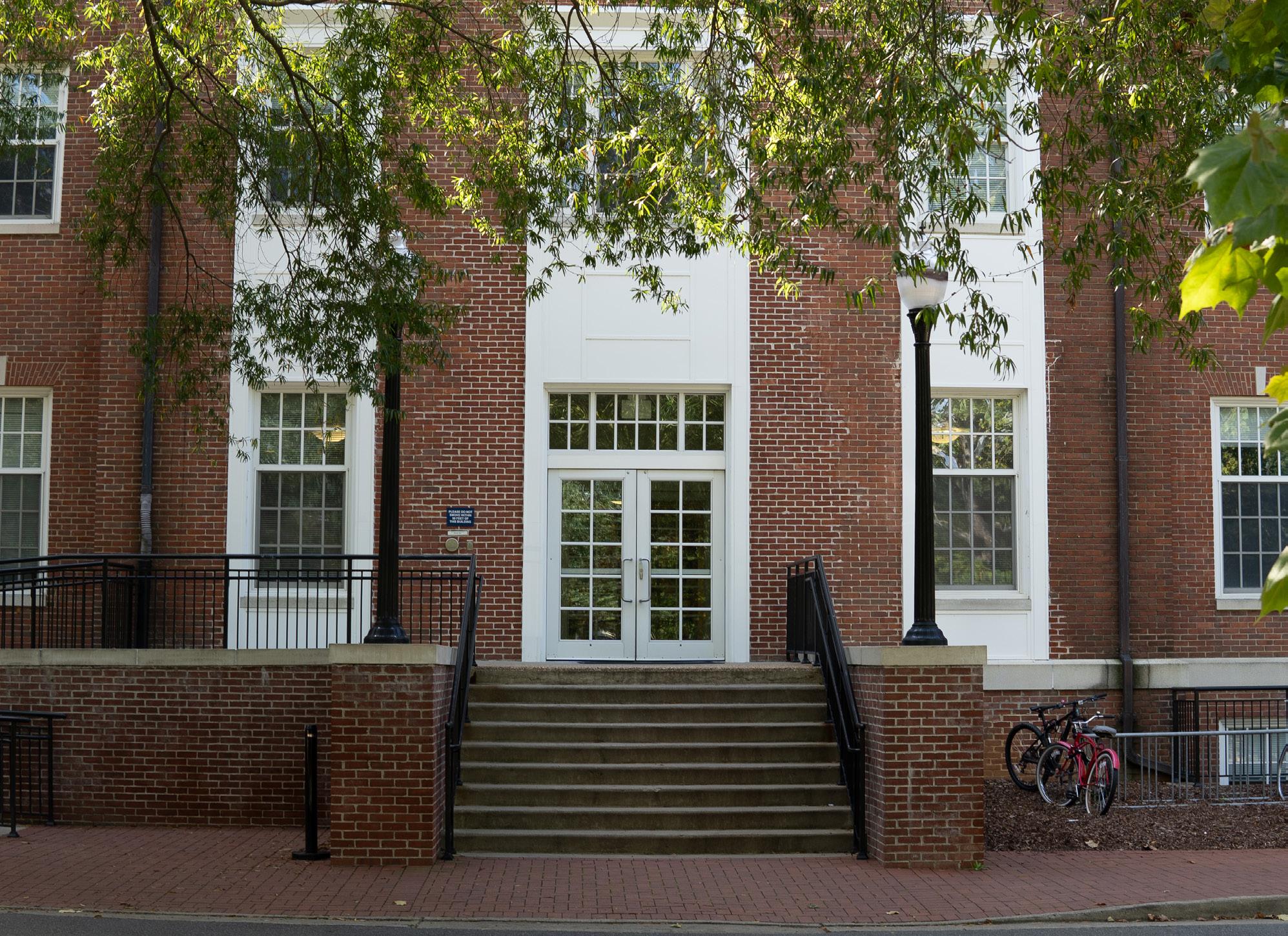

Her perspective reminds us that visible security does not always equate with a sense of security. Sometimes, quiet security measures, like door access restrictions, can help more than patrols in uniform.
Prevention is invisible when it works. If someone who doesn’t belong in a building can’t get inside, we may never know what problem we avoided. In a time when universities across the country are re-evaluating how to protect their communities, we shouldn’t wait for a wake-up call to take simple action.
“In a time when universities across the country are re-evaluating how to protect their communities, we shouldn’t wait for a wake-up call to take simple action.”
- Noah Fellinger
An open campus can still be a safe campus, but it doesn’t have to be open in every way. Requiring an EagleOne to enter buildings wouldn’t erase UMW’s charm, its history or its community spirit. It would simply put a layer of protection between students and the unknown, one scan at a time.
In the end, this isn’t about fear. It’s about being proactive. We all chose UMW for its welcoming energy and strong sense of community. Let’s do what we can to protect that smartly, calmly and with respect for everyone who calls this campus home.
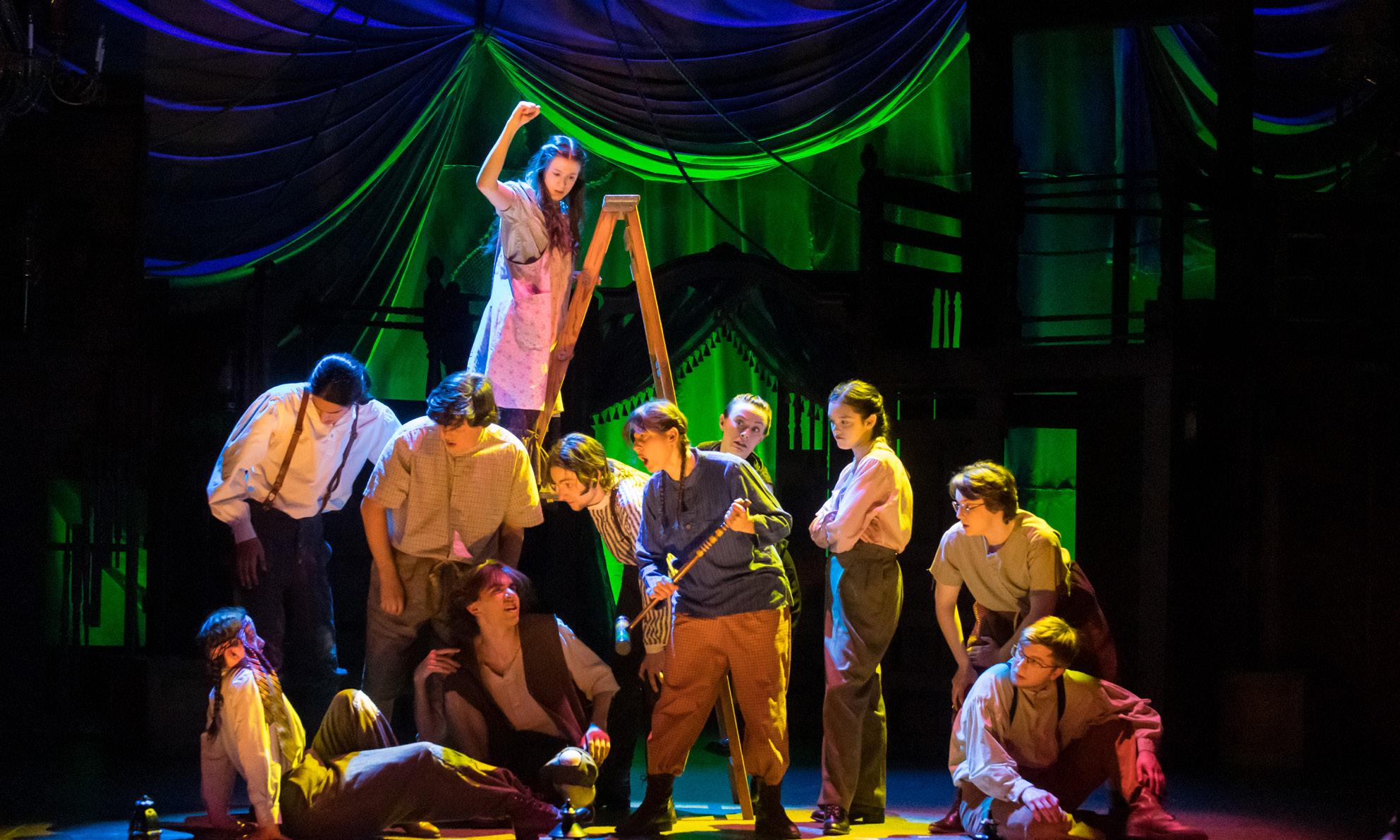
Do you need a break from preparing for finals? From April 3 to 19, UMW Theatre’s “Peter and the Starcatcher” is in production. As a true patron of the arts, I attended the April 2 showing instead of doing my homework.
The play acts as Peter Pan’s adventurous origin story and how Neverland came to be. The swashbuckling tale explores themes of youth, identity and finding your family in the most unexpected places.
From the looks of it, you may think that it might be childish and boring because it is a children’s play. However, I was wrong. I realized that my jaded college kid attitude killed my inner child. I found myself laughing throughout the play and thoroughly enjoying every scene.
“It’s ultimately a play about storytelling, and something that we’ve been working on and been directed to do since the very start, is to squeeze the story out of every single moment in the show,” said freshman Ben Kline, who plays Boy and Peter Pan. “I think one of the most challenging things, but also the most fun things in the performance, is having to go at each line with the knowledge that this line is telling a story.”
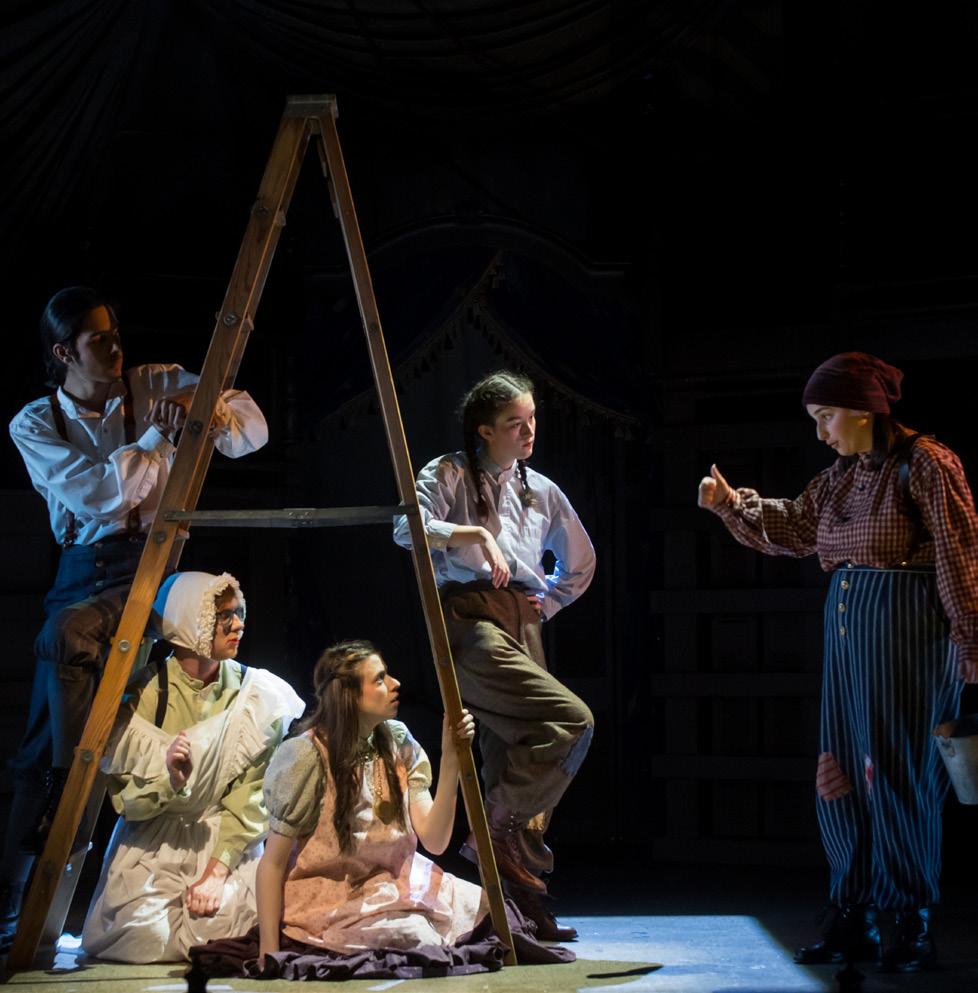
“Peter and the Starcatcher” is set in 19th-century England. The show follows two voyaging ships, the “Wasp” and the “Neverland.” The “Wasp” is responsible for a precious trunk of magical dust with transformational powers called starstuff, while the “Neverland” has the decoy trunk. When the “Neverland’s” sly captain, Bill Slank, switches the trunks, the situation goes awry when the pesky villain Blackstache gets involved and the heroes Molly Aster and the three orphan boys: Prentiss, Ted and Boy, try to protect the starstuff.

“While this show has a lot of stuff for kids, I almost feel like in my heart, it’s a show meant for college students, because it’s about growing up, and it’s about wanting to stay young,” said senior communication and digital studies and theatre double major Cora Denny, who plays Alf. “I think it can resonate with these first-year students who are coming in and figuring out, ‘I’m a fresh adult. I’m learning how to navigate this world.’ Then us seniors, we’re graduating and we’re growing up.”
The referential comedy was clever but not too out of reach. The jokes included poking fun at Russian-American author and philosopher Ayn Rand and alluding to a Michael Jackson music video. I found Blackstache, who is played by senior theatre major Rob Willcox, to be very amusing. I praise the skill of wiggling an enormous stache as a comic relief.
The relationship between Mrs. Bumbrake, who freshman historic preservation major Lucas Bickford plays, and Alf, played by Denny, had great chemistry as the comedic couple who found love amidst nautical chaos.
Secondly, the set design was outstanding. The stage was a jungle gym of random furniture that took you back to your childhood playground. When you Google search the stage designs for “Peter and the Starcatcher,” it resembles a ship or some variation of it. Rather than following past productions of the play, UMW Theatre’s stage design went against the grain. Making the stage resemble a playground was a deliberate choice to immerse the audience with its child-like aesthetic, cohesive with the play’s encouragement of youthful imagination.
“One of the big discussions was the way that we wanted to present this show as a childhood imagination world,” said senior computer science and theatre double major Cameron Zakreski, who plays Prentiss. “We’re asking the audience to come along for that ride where, like, yes, we are using a ladle as a spoon, but when you’re a child and you’re playing, that ladle is a sword.”
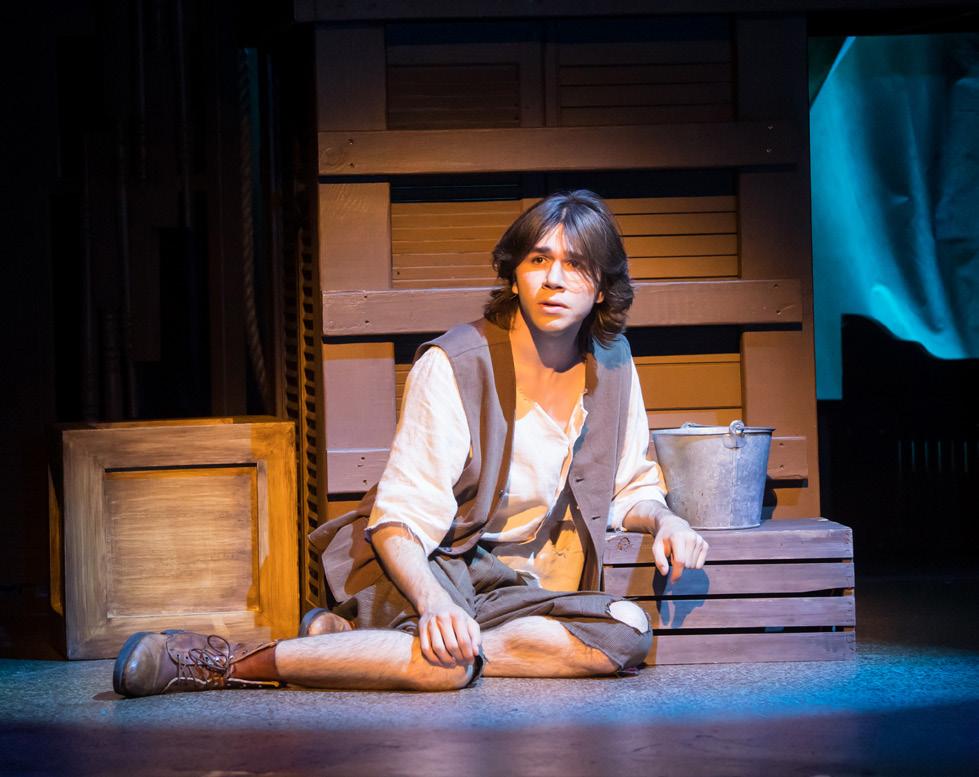
In terms of choreography, the cast was very fluid and dynamic. They were a flawless herd of theatre kids that made good use of space. A noteworthy scene showcasing this is when Molly looks for pigs in the ship; the actors transform the stage into a lively ship full of gambling, faithful worship and other seafaring shenanigans. With the help of lighting and sound, the actors move in the dark and into their places before Molly opens the “door” to another room in the ship. There are also a few musical numbers in this play, which were wonderfully executed and captivating to watch.
Senior theatre major Nikki Rizzo, who played Molly Aster, reflected on her performance in the closing musical number of the first act, which brought a sense of accomplishment and inspiration.
“We had this brilliant closing act, one musical number, and I’m standing up on this platform. So it’s kind of impossible not to see the front row when I’m looking down at Peter at the front of the stage,” said Rizzo. “Front and center were these two little kids. The little girl had her hands to her heart and her eyes were as big as saucers. In that moment, I was like, ‘Yeah, this is it. Like, this is why we do this.’ These are the kids we’re telling this story for. I like to believe that we left a lasting impact on them and on everyone in the audience.”
UMW Theatre’s production of “Peter and the Starcatcher” is a passion project of the theatre department and an enjoyable experience for those who choose to become part of the audience.
So, you’ve come this far. Go put the paper down, grab five bucks and head to Klein Theatre for your inner child’s sake before it’s too late.
On a rare night in, roommates Abbey, Ainsley and Ky settled in to watch their favorite TV show, but realized there was an empty spot on the couch.
“We were watching Vanderpump Rules, and we were like, something is missing, so we called Penny in to join us,” recalled Ainsley Lord, a junior biology and environmental science double major.
The girls’ fourth roommate, Penny, a mini Australian Shepherd, came into the living room and joined them on the couch. She curled up in Abbey’s lap, wiggling her tail nub as she indulged in the attention.
Abbey Magnet, a senior communication and digital studies major, is one of about 50 students who have been approved by the Office of Residence Life and Housing to have an Emotional Support Animal on campus for her anxiety.
“An emotional support animal is defined as any animal with a primary role of providing a person with a disability emotional comfort,” according to guidance from the Office of Disability Resources.
Magnet, who transferred to UMW from Northern Virginia Community College during her sophomore year, brought Penny to campus a year later, making her a transfer student too. Having Penny on campus completely shifted Magnet’s experience because she says having her dog was both a comfort and allowed her to be more outgoing.
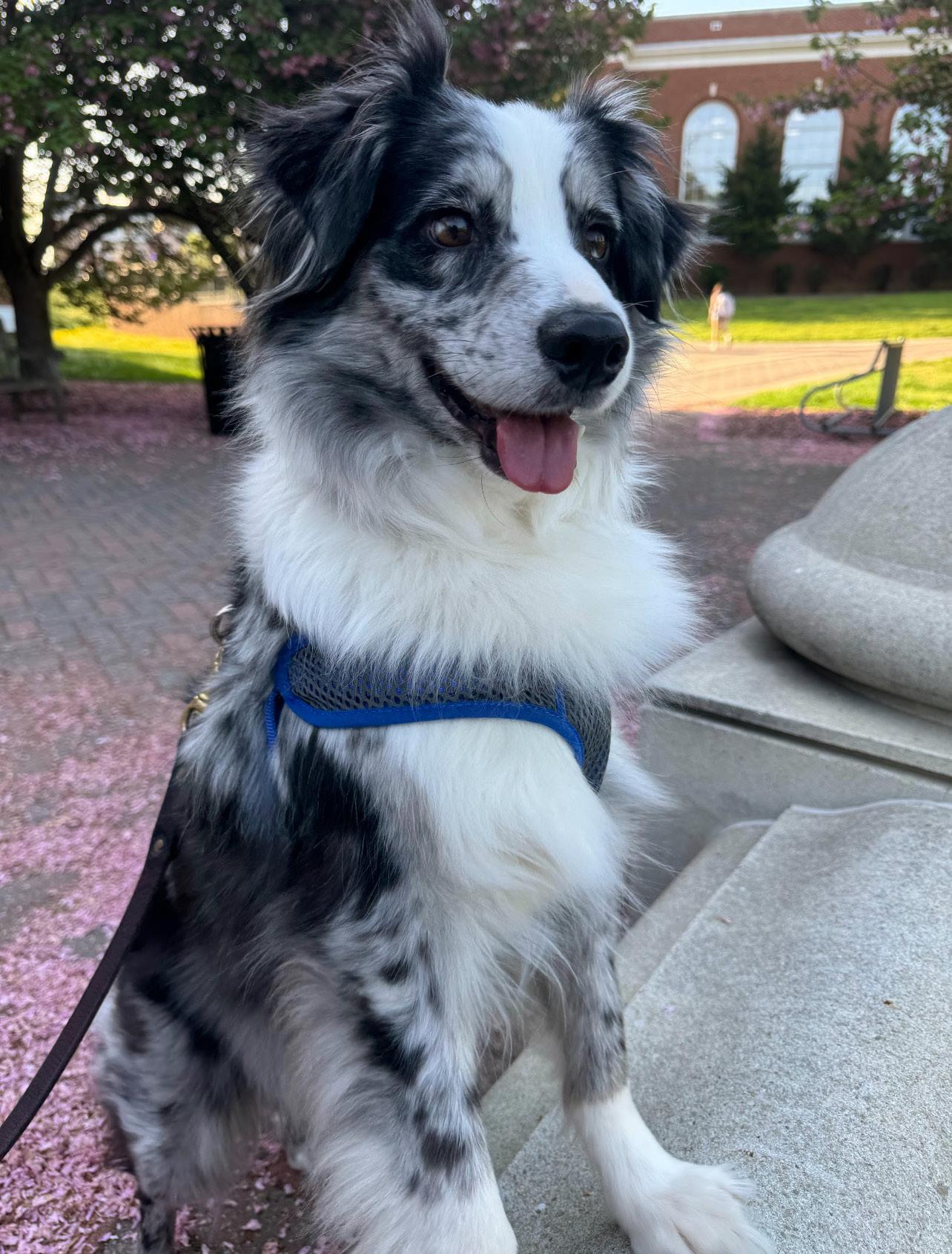
“I was finally able to kind of get out of my shell and do the things that I was always afraid to do. Living with Penny has pushed me out of my comfort zone,” said Magnet.
Penny’s presence allows Magnet to interact with more people. On their walks, people come up to Magnet and her pup. Pushing her to be more social is essential for her mental health and keeps her from shutting people out when she feels anxious.
“She helps me make those connections I was missing,” said Magnet Magnet’s roommates can also see the benefits that Penny brings to her life.
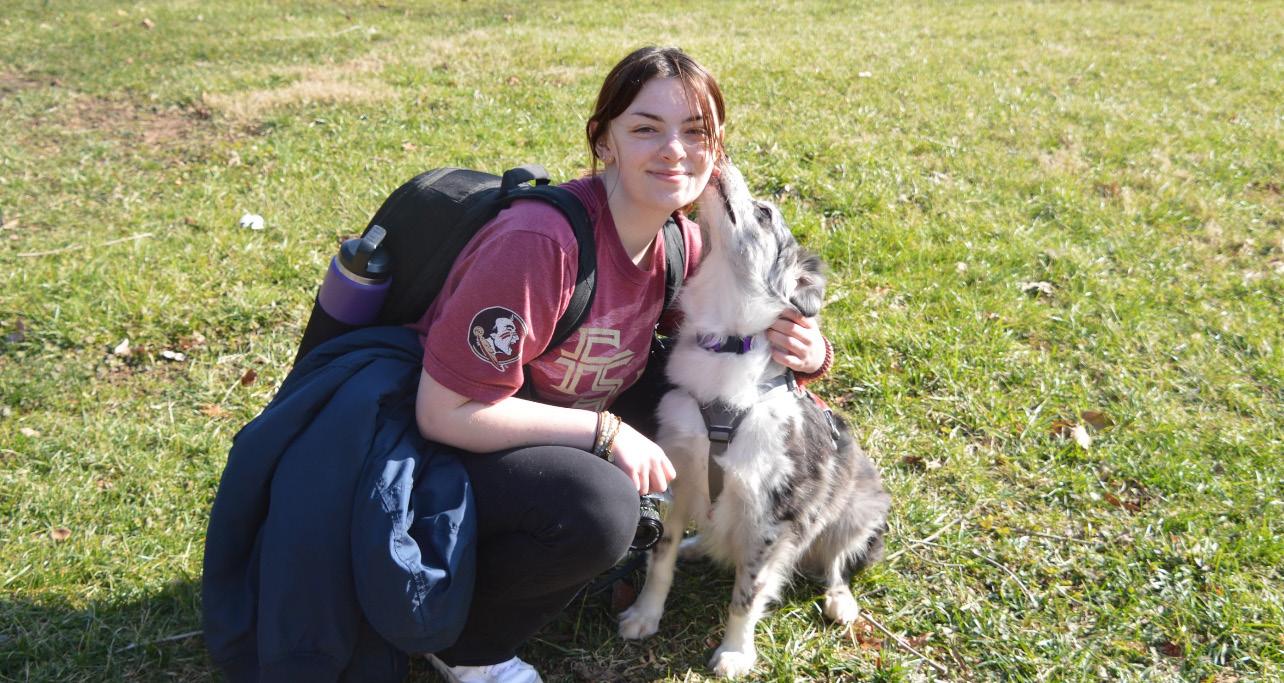
“Whenever Abbey gets anxious, Penny’s there to comfort her. Even if she is just upset about something, Penny is always there,” said junior English major Ky Huynh. Penny also provides Magnet with discipline that she felt she was previously lacking.
“She helps me get out of bed in the morning, honestly,” she said. “She likes to come and jump on me and paw at my face when she is ready to go out. This is not only good for her, but it’s good for me.”
Students who have a support animal often describe it as a symbiotic relationship. Magnet provides care but also receives it in return, and both of them thrive in that reciprocity.
“Not only is Penny Abbey’s emotional support animal, but it is clear that Abbey is Penny’s emotional support human,” said Lord.
After transferring to UMW, Magnet lived in a dorm in her first semester, hoping to feel like she had a home on campus. Unfortunately, her first year offered less time for building a home away from home and more time for building anxiety and stress.
“I would go home every weekend because I got very homesick,” said Magnet. “It was just really hard for me to be away from home and away from a dog or family.”
This anxiety led her to find an ESA. Magnet and her parents scoured the internet for the perfect pup.
After months of searching, they found a Facebook ad for a dog rescue, For The Love of Paws. The Knoxville, Maryland, rescue is home to dogs of all ages and abilities.
“I was looking for an adult who was house trained and who had a great temperament, who was loyal, who was going to be very easy going for me,” said Magnet.
Penny fit her criteria perfectly. Known as Bliss at the time, her Facebook ad read as follows:
“Sweet Bliss, who is just a bit shy but warms up quickly. She loves other dogs, kids and loves to play, just wants a family to call her own.”
Magnet and her mother drove to the rescue two days later to meet ‘Bliss’ to see if she was the right fit, but once Magnet laid eyes on her, she knew she had found her dog.
“She just matched my energy and we just fell in love,” said Magnet. “All that needed to change was that stupid name.”
Magnet decided to stick with the Beatles theme that her parents had used to decide her name, as well as their other dog, Ringo. She decided on Penny Lane for her new pup.
After claiming Penny as her own, Magnet needed to register her as an ESA so that she could live on campus with her.
The registration process consists of a series of forms detailing that the owner will be responsible for their pet and to minimise possible roommate conflict as well as animal safety concerns, according to the Office of Disability Resources.
Students must update these forms each year to keep their pet on campus, but the hassle is worth it for Magnet. Registering Penny as an ESA has changed her life and her friends can see the benefits.
“I have definitely seen her mental health get better since having Penny on campus,” said Lord. “She sometimes goes like a week without her and you can see the decline and then she will boost right back up again once Penny returns.”
Now, Magnet is preparing for graduation and wonders how her relationship with Penny will change.
“I can’t imagine living without Penny anymore,” said Magnet. “She has made such an impact on my life here at Mary Washington and I am determined to include her in this next chapter of my life.”
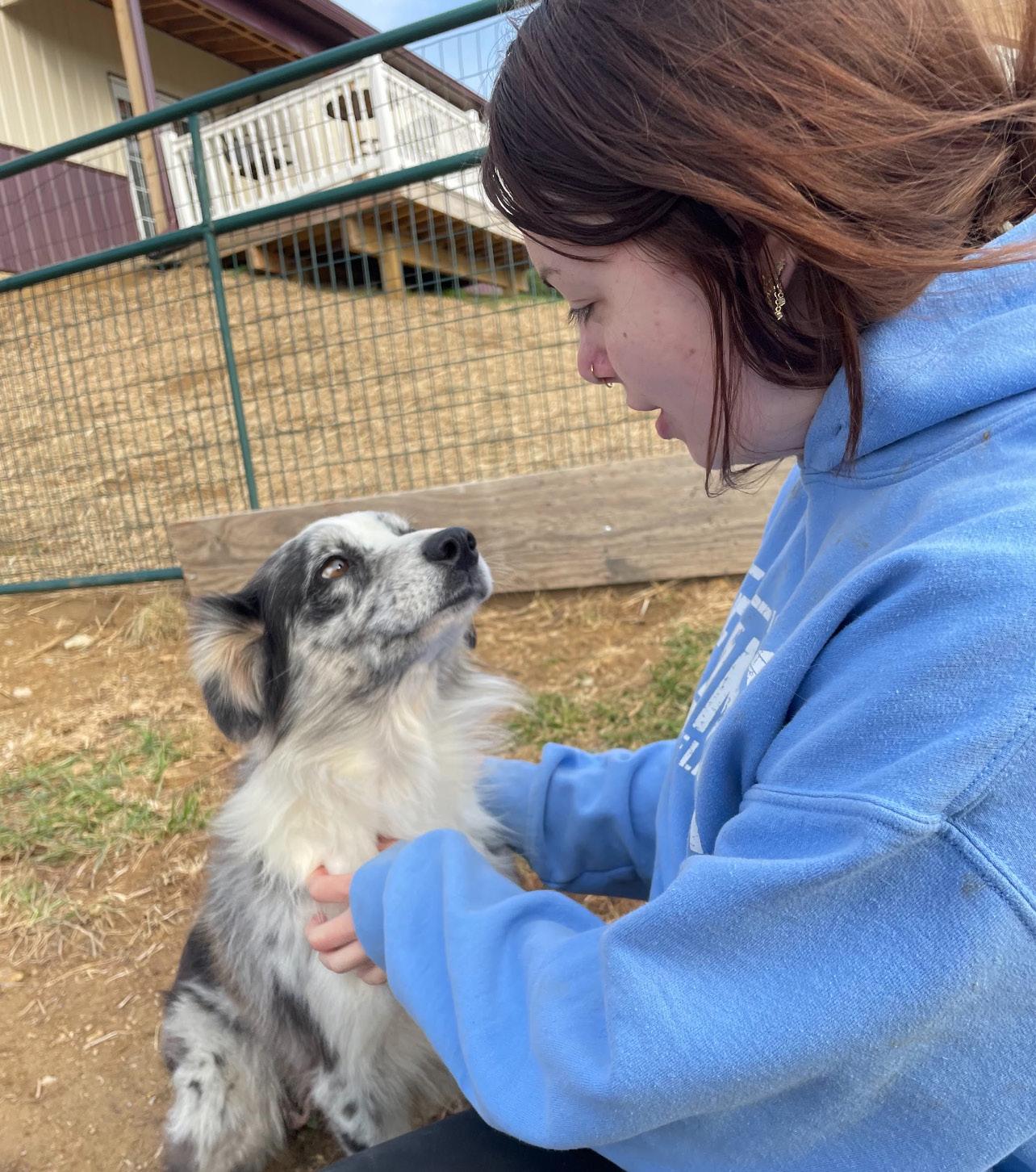













ELLA CORDLE Staff Writer
Since 2023, a committee has been working to reorganize academic departments across UMW. The reorganization plan aims to consolidate programs for financial and practical benefits.
Since then, several departments have already changed their classifications within all three colleges—the College of Education, the College of Business and the College of Arts and Sciences—and more are still in the planning stages or awaiting approval.
The College of Business now includes the computer science, economics and mathematics departments. It is led by Filiz Tabak, who was hired by UMW and appointed as Dean during the summer of 2023.
The departments of health and physical education, athletics and nursing are being moved to the College of Education, which Dean Peter Kelly heads.
Sociology and anthropology were previously a combined department, which has now been redistributed. Sociology has been added to the Department of History and American Studies, and anthropology has been moved into a department with art history, classics, philosophy and religious studies, known collectively as AACPR. Art history formerly shared a department with studio art, which is currently its own department.
“Our decision in AACPR was a faculty-led decision,” said Laura Mentore, chair of the AACPR department. “We proposed to come together and form a new department, and we have been very happy with our arrangement.”
Executive Director of University Communications Amy Jessee said that while everything stated thus far has been approved and put in place, more changes are awaiting SCHEV review.
“The proposals for the School of the Sciences and School of the Arts are in progress with one submitted to SCHEV in March and the other pending submission,” she said.
In order for the university to make large changes such as these, they require approval from the State Council of Higher Education for Virginia (SCHEV), which is a big part of why these changes are taking so long to arrange and implement. In a response to a request for information about the overall progress of this reorganization plan, UMW Pro-
EMMA KINGKEO News Editor
The Crime Column is based on UMW Police reports from April 2 to April 9.
There has been no crime reported since The Weekly Ringer’s last publication on April 4.
vost Tim O’Donnell explained that SCHEV only accepts a limited number of changes per school and only allows submitted proposals for these changes three times a year.
Although these two schools have not yet been officially reorganized, related faculty appointments have been made. Lynn Lewis, chair of biological sciences, will become Director of the Sciences within the College of Arts and Sciences. Chair of Theatre and Dance, Greg Stull, has been appointed Director of the Arts. Both of these appointments will officially take effect in the summer of 2025.
Although much is changing across various academic departments throughout all three UMW colleges, majors, programs and classes will all remain the same for students. The main areas of effect will be communication between faculty in programs that have been deemed more closely academically related.
“Our majors share a lot in common and we believe that being together in the same department has a lot of advantages for our students,” said Mentore.
These changes are still ongoing and are not yet fully reflected on the UMW Website, Banner, or handbooks and catalogs related to the university. O’Donnell said in an email to The Weekly Ringer that “the hope is to make all of the changes for the AY26-27 catalog,” which aligns with the original timeline the committee had intended.

Friday, April 11, 2025
UMW esports welcomed new Director Eric Gyamfi to the program this week. Coming in with a Bachelor of Science degree in Esports Management, Gyamfi arrived during a week important to the team, as they were preparing for a postseason tournament in the popular video game “League of Legends” where they were ranked 23rd out of 24 teams. After already defeating two teams, esports prepares for their quarterfinal match against Plymouth State University Friday night. Senior environmental science major Eric Torres, sophomore business administration major Sean Price and sophomore computer science major Kaleb Lucas were practicing for their match late in the esports lounge.
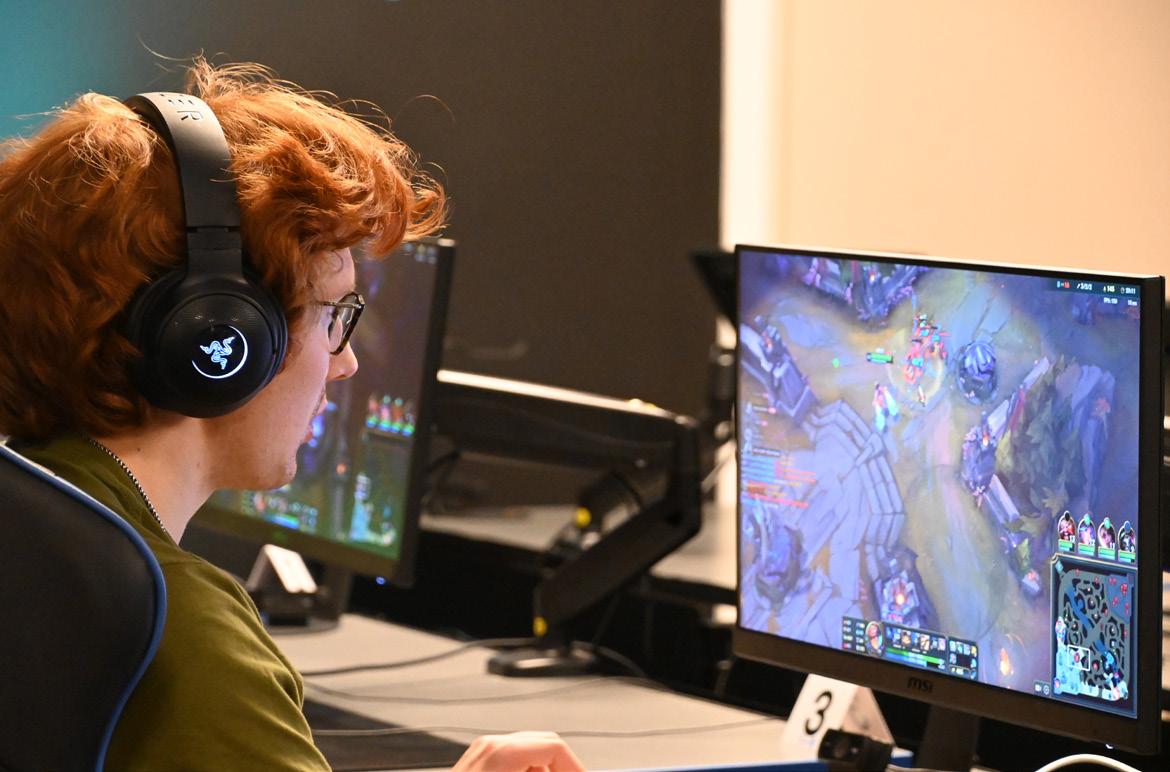
“We’re establishing a legacy at UMW . . . everybody here is putting in the work, everybody’s doing a really good job.”
- Eric Torres
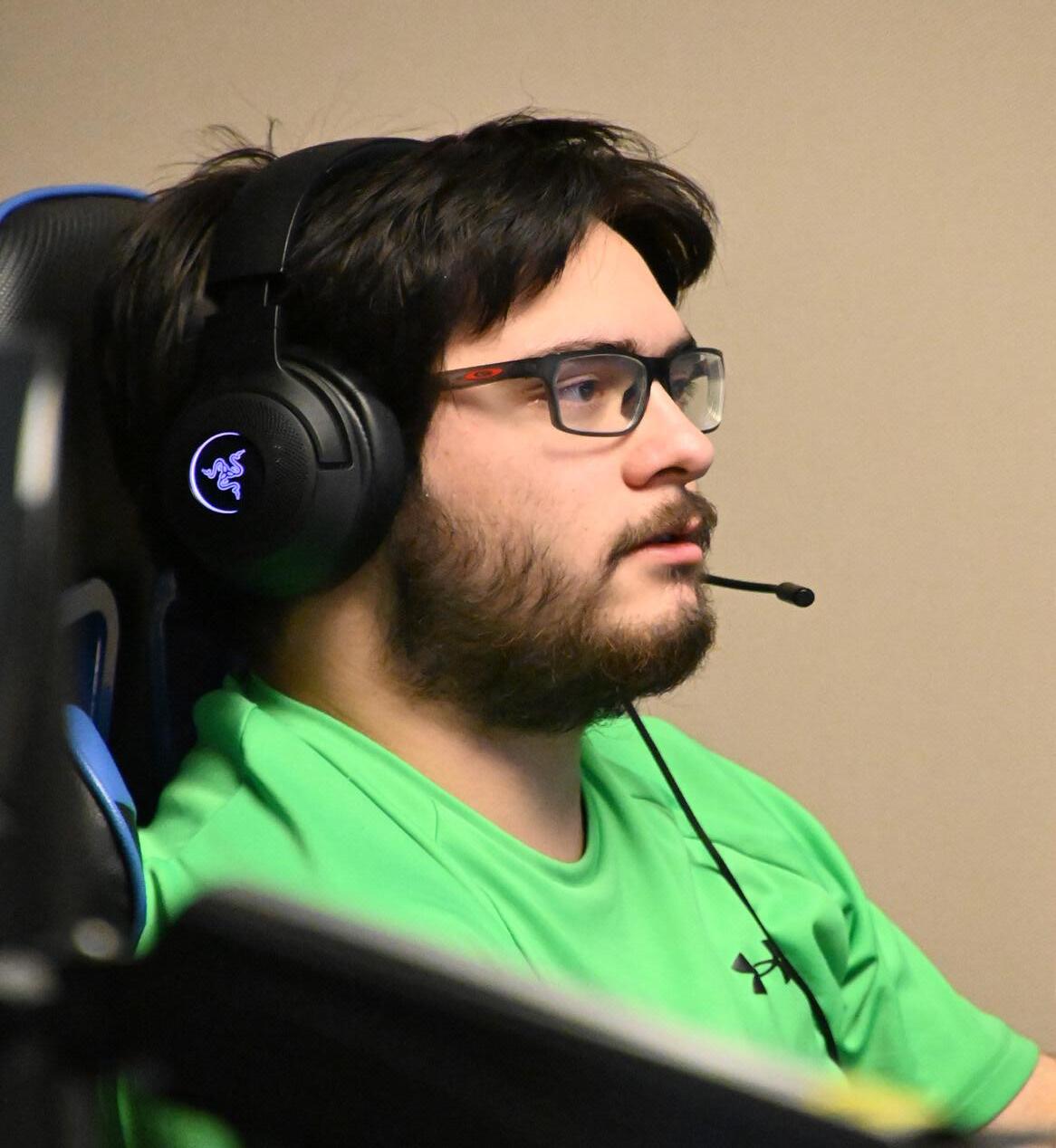
“I’m super proud of these guys. I’m too proud of everything that they’ve done, the work that they put in. I just couldn’t be happier.”
- Eric Torres

“All of our games are live streamed so that we can have maximum outreach and just make sure that parents can watch their kids.”
- Sean Price
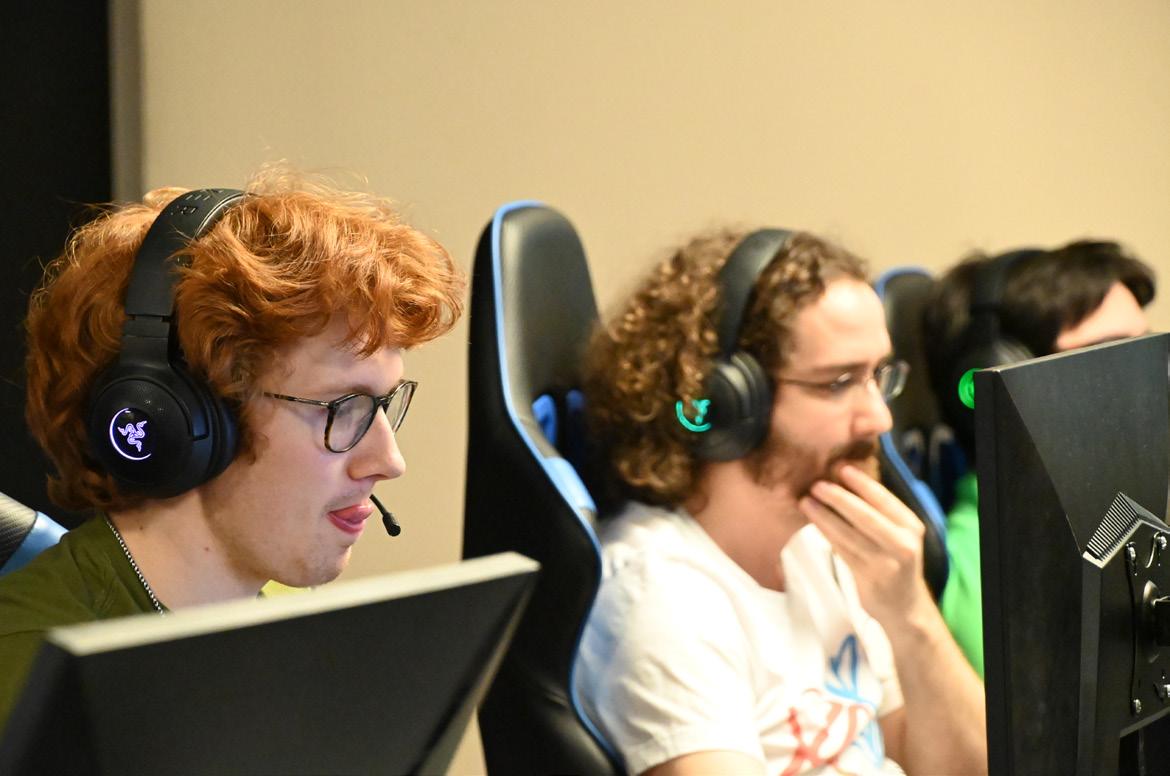
“I think we’re the wild card and I think people should be afraid of us, I don’t think we’re really afraid of them.”
- Eric Torres
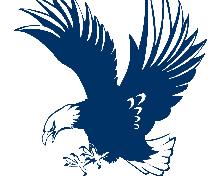
Baseball (22-6)
Apr. 6 vs. Notre Dame of Maryland University (6-1), (12-2)
Apr. 12 @ Salisbury University
Softball (8-20)
Apr. 12 vs. Salisbury University
Apr. 15 vs. Sevenson University
Men’s Tennis (12-6)
Apr. 5 vs. Swarthmore College (6-0)
Apr. 12 @ Sewanee Apr. 16 vs. Salisbury University
Women’s Tennis (5-7)
Apr. 5 @ Case Western Reserve University (1-6)
Apr. 6 vs. Otterbein University (7-0) Apr. 12 @ Salisbury University
Men’s Lacrosse (8-5)
Apr. 5 @ Montclair State University (13-7)
Apr. 9 vs. Salisbury University (6-14)
Apr. 16 @ Christopher Newport University
Women’s Lacrosse (10-2)
Apr. 2 @ York College of Pennsylvania (5-14) Apr. 12 vs. Christopher Newport University
Men’s Rugby (4-7)
Apr. 12 @ Queens College 7s Event
Women’s Rugby (2-3) Apr. 12 @ University of Maryland
Games are available to watch via livestream on the UMW Athletics webpage www.eagles.com/composite